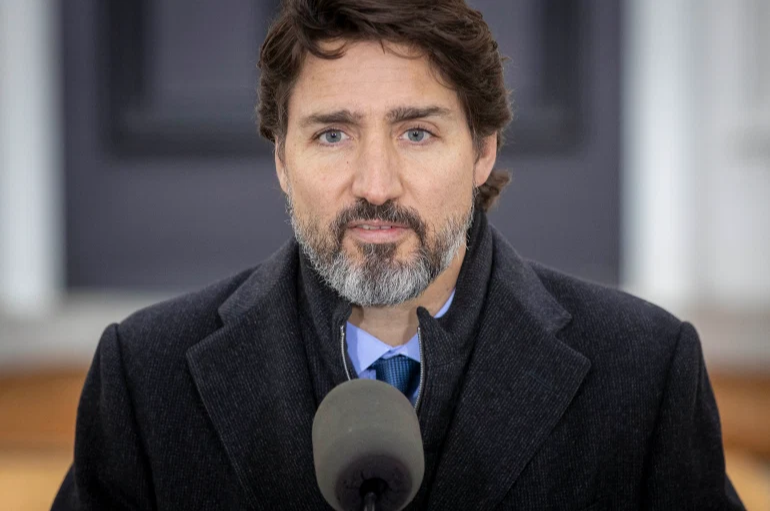
Canadian Prime Minister Justin Trudeau speaks during a COVID-19 pandemic briefing from Rideau Cottage in Ottawa. (Photo: Lars Hagberg/AFP)
Ottawa, February 14 (RHC)-- Air travellers to Canada will quarantine in a hotel starting on February 22nd as they await the result of a coronavirus test, Prime Minister Justin Trudeau said in Ottawa, the Canadian capital. Trudeau previously announced stricter restrictions would be imposed on non-essential air travellers in response to new, likely more contagious coronavirus variants.
Canadian government officials confirmed that – with limited exceptions – non-essential air travellers will be required to reserve a three-night stay in a government-authorised hotel at their own expense before they depart for Canada. Those who cross the United States border by land will not have to isolate at a hotel, but will have to show a negative test taken within three days before arrival and be tested on arrival as well as toward the end of a 14-day quarantine at home or elsewhere.
Public Safety Minister Bill Blair said less than five percent of those who cross the land border are non-essential, one reason why the hotel stay is not required for those who enter by land. Canada, a country of almost 36 million people, has confirmed over 823,000 coronavirus cases and suffered 21,142 deaths since the pandemic began, according to the Johns Hopkins University tally.
The measures especially affect Canadian “snowbirds” who winter abroad and return home in the spring. Health Minister Patty Hajdu said vaccinated Canadians will not be exempt because research is still not clear on whether those vaccinated can still transmit the virus to others.
Trudeau said it could take up to three days for test results to be available, and he previously said the cost of a hotel stay for air travellers could be $2,000 Canadian ($1,576 U$D). The steep cost for the hotel stay includes the cost for security, food and measures hotels will have to take to keep their workers safe.
Travellers would then isolate at home or elsewhere if the test is negative. Canada already requires those entering the country to self-isolate for 14 days and bans non-essential travel to the country. The Canadian Snowbird Association has said the cost of the hotel stay poses financial hardship for many, and travellers who test negative should be able to quarantine in their homes.
Some snowbirds are flying back before a hotel stay is mandatory. Dr Morley Rubinoff, 71, told the Associated Press he left his condo in Puerto Vallarta, Mexico, about six weeks early this year to avoid what he called “hotel hell.” The semiretired dental specialist said he arrived in Mexico on December 31 and had planned to stay until mid-March before returning to Toronto.
Chief Public Health Officer Theresa Tam said Friday that there have been more than 429 cases of a worrying variant first identified in the United Kingdom, and 28 cases of the variant first identified in South Africa reported across eight provinces. So far, there has only been one report of the variant first found in Brazil.
While Canada has contracted for far more vaccines than it needs to cover its population, they have been slow to arrive, frustrating many who see a faster roll-out in the neighbouring U.S..
Canadian officials have said Trudeau spoke with U.S. President Joe Biden about the possibility of getting Pfizer vaccines from a plant in nearby Michigan, whose first 100 million doses are already contracted for by the U.S. government.
“I think the president has been clear publicly and certainly privately when the conversation comes up that his focus now is on ensuring that the American people are vaccinated,” White House Press Secretary Jen Psaki said when asked about Canada on Friday.
Canada, which does not have domestic production, has been contracting for vaccines from Europe and elsewhere. Trudeau said he spoke to the chief executive of Pfizer and said he confirmed Canada will get four million doses from that company before the end of March, as well as 10.8 million doses in April, May and June — more than previously announced.
Trudeau also said Canada is buying another four million Moderna vaccines and is looking at the possibility of getting vaccines from India.

